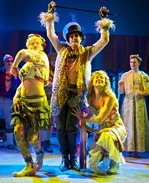SITE GUIDE
SEARCH
REVIEWS
REVIEW ARCHIVES
ADVERTISING AT CURTAINUP
FEATURES
NEWS
Etcetera and
Short Term Listings
LISTINGS
Broadway
Off-Broadway
NYC Restaurants
BOOKS and CDs
OTHER PLACES
Berkshires
London
California
New Jersey
DC
Connecticut
Philadelphia
Elsewhere
QUOTES
TKTS
PLAYWRIGHTS' ALBUMS
LETTERS TO EDITOR
FILM
LINKS
MISCELLANEOUS
Free Updates
Masthead
Writing for Us
A CurtainUp  London Review
London Review
 London Review
London ReviewHenry V and The Winter’s Tale
by Sebastian King
|
The King shall live without an heir, if that which is lost be not found. — Officer, The Winter’s Tale
|

Cast in Bohemia in The Winter’s Tale (Photo: Manuel Harlan) |
As they burst onto stage to open Henry V - belting out The Pogues’ ‘A Pair of Brown Eyes’ - the ensemble has never looked or sounded in finer shape, a testosterone-driven powerhouse of energy and danger. Michael Pavelka’s ‘unworthy scaffold’ of a set suggests that we are in a 21st century army barracks as a troop prepare for war. The role of Chorus is shared between the whole cast, perfectly summing up the essence of an ensemble in which cast members rarely leave the stage, constantly swapping between characters, regardless of age or gender, and all responsible for manipulating scenery and providing frequent musical interludes in both productions, and in the case of Henry V, during the interval too!
In the kingly title role, Dugald Bruce-Lockhart shows few signs of Prince Hal, already seeming weathered in the opening scenes, and in a subversion of the usual ‘coming-of-age’ journey, war actually seems to reinvigorate him and recall his youth. Edward Hall’s production doesn’t shy away from the complexities of this king: yes, he’s a rousing man of the people, but he’s also a ruthless conqueror. In this modern-dress production, the recurring presence of an axe is a constant reminder of the primal barbarism of conflict, and the decision to present Katharine (wittily played by Karl Davies) in traditional Elizabethan dress suggests that this is a world in which women have been left behind.
By contrast, The Winter’s Tale starts as a far more refined affair, with the ensemble looking rather suave in grey suits, the court of Sicilia suggested by a mirrored set that invites us to observe ourselves, as well as the characters onstage. A moon hovers above the action, keeping Sicilia in perpetual night. When we journey to Bohemia after the interval, darkness is replaced by light, with the cast appearing in increasingly bright and wacky costumes, and an onstage band, ‘The Bleatles’, providing plenty of musical opportunities, including an inspired rendition of Beyoncé’s ‘Single Ladies’.
Despite the strong conceptual aspects of the production, storytelling and emotion are placed firmly at the fore, and the performances are some of the most moving I’ve witnessed. Doubling as Mamilius and Perdita, Ben Allen provides a sympathetic portal through which we see the action unfold, always present – part vulnerable victim, part puppet-master - manipulating toys bearing a strong resemblance to those onstage. The early scenes between Richard Dempsey’s touching Hermione and Robert Hands’s troubled Leontes are heartbreaking, and their final scene is magical. Tony Bell’s ageing rockstar Autolycus breaks the fourth wall, and provides a much-needed injection of humour, and contrasts with his equally engaging Fluellen in Henry V. But it is Vince Leigh as Paulina (completely unrecognisable from his earlier incarnation as Pistol) who gives the most remarkable performance, towering above his cast members as a feminine force to be reckoned with, expressing a gamut of emotions with a restrained sensibility.
Although much has been made of the all-male casting, this is only one aspect of what makes Propeller special and is simply forgotten after the first few moments. With a brisk pace, clear storytelling, and a fearless cast, these are two of the most powerful – and honest - Shakespeare adaptations I have seen. Edward Hall and Propeller have a unique recipe for creating theatre that has the power to move, entertain and inspire – often all at once. If you only see one Shakespeare production this year, let it be one of these.
| Henry V and The Winter’s Tale
Written by William Shakespeare, adapted by Edward Hall and Roger Warren Directed by Edward Hall Starring: Dugald Bruce-Lockhart, Vince Leigh, Tony Bell, Robert Hands, Richard Dempsey, Nicholas Asbury, Chris Myles With: Gunnar Cauthery, Dominic Thorburn, Finn Hanlon, Gary Shelford, Karl Davies, John Dougall, Ben Allen Design: Michael Pavelka Lighting: Ben Ormerod Music: Propeller, with original compositions and arrangements by Nicholas Asbury and Gunnar Cauthery Sound: David Gregory Movement: Gary Shelford Running time: Henry V Two hours 45 minutes including interval, The Winter’s Tale Two hours 55 minutes including interval Box Office: 020 7722 9301 Booking to 21st July 2012 Reviewed by Sebastian King based on 6th July performances at Hampstead Theatre, Eton Avenue, London, NW3 3EU. (Tube: Swiss Cottage) |




